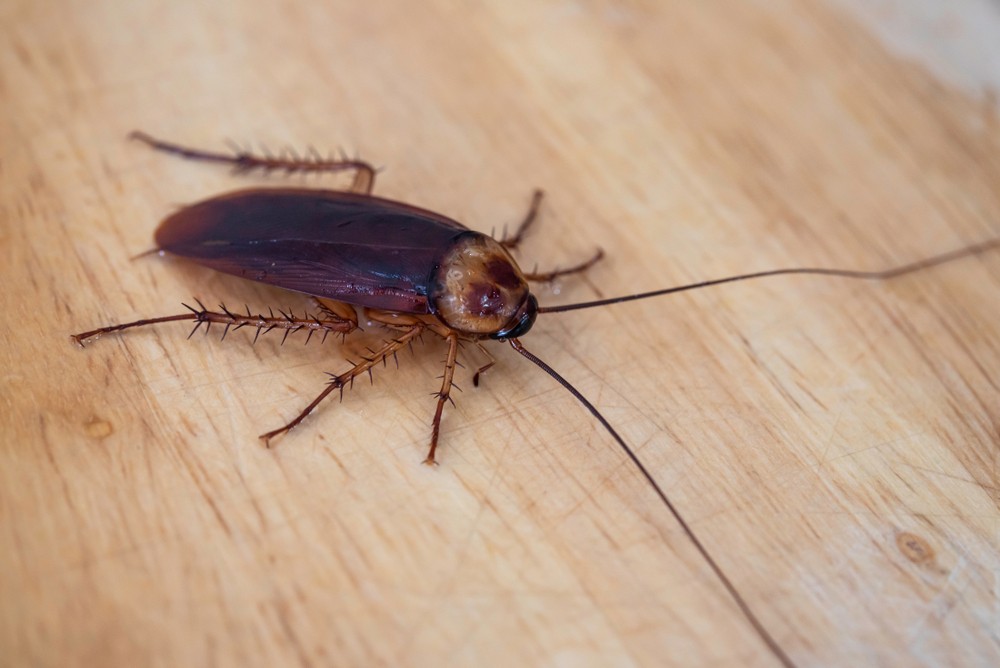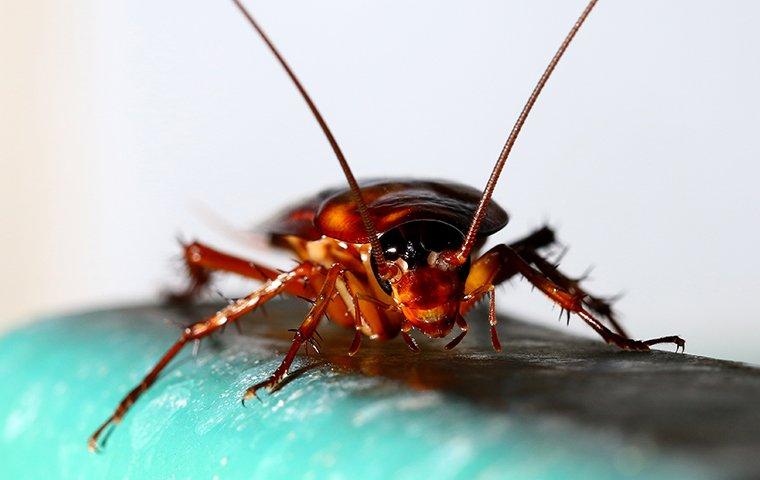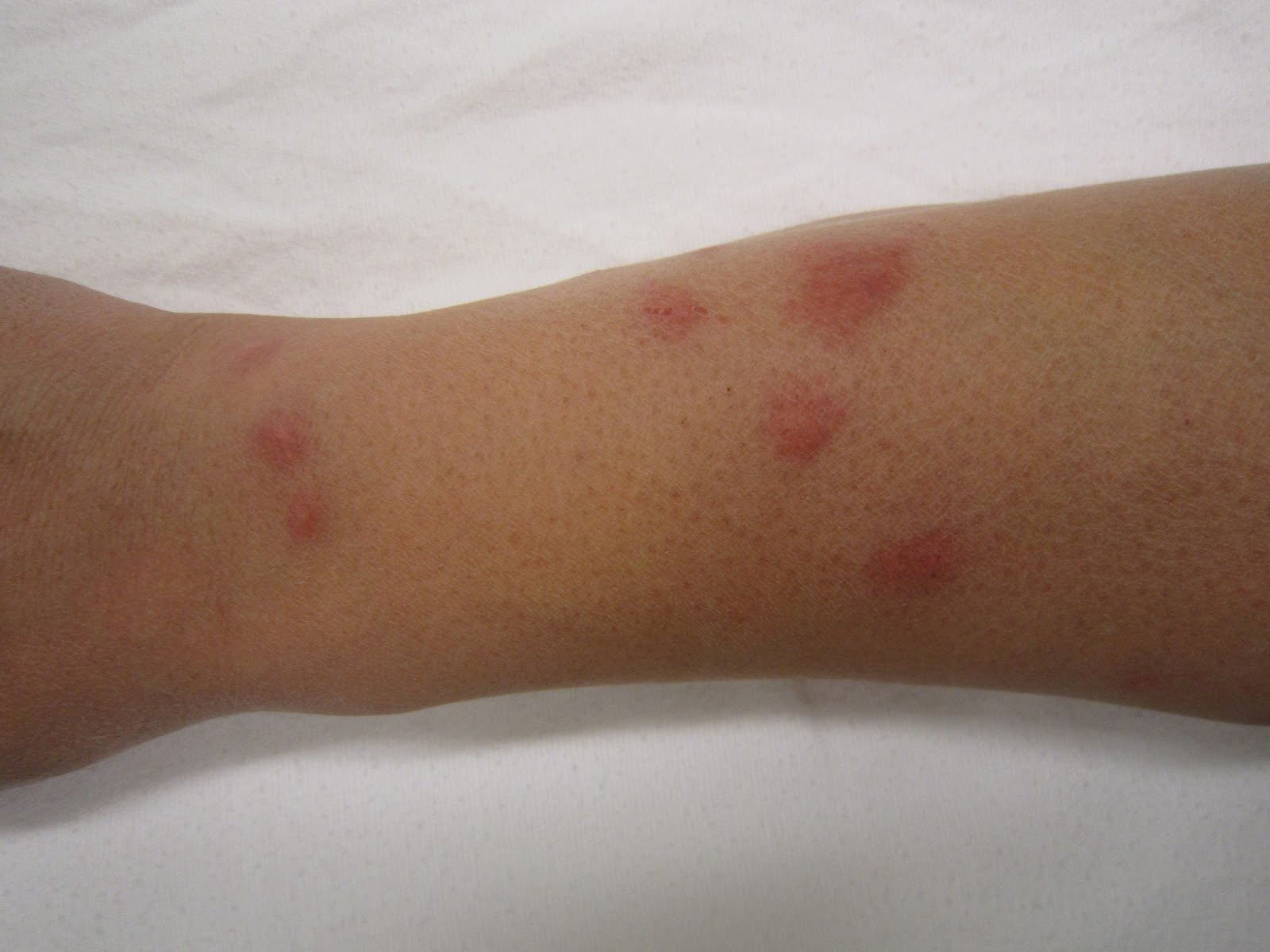Cockroach bites can cause irritation, redness, and swelling. These bites may also lead to infections due to the bacteria cockroaches carry.
Cockroaches seldom bite humans, but when they do, the experience can be unsettling. Known for their scavenging nature, these pests often venture out at night, which means bites typically occur during sleep. The risk of encountering a cockroach bite rises with the level of infestation in a dwelling.
Most commonly, bites are not serious and result in minor skin issues. Nevertheless, because cockroaches can harbor various pathogens, it’s crucial to maintain cleanliness and control infestations to prevent potential health risks. Practicing good hygiene and regular pest control can minimize the chance of bites and associated health concerns.

Credit: www.cannonpestmanagement.com.au
Cockroach Bites: A Rare Occurrence
Imagine you’re fast asleep, and a slight nibble wakes you. Could it be a cockroach? Their reputation doesn’t typically include biting humans. But while cockroach bites are rare, they can happen. Let’s shed light on this somewhat mysterious behavior.
Misconceptions About Cockroach Biting Habits
Many believe cockroaches bite routinely. In truth, these pests prefer to avoid conflict. Cockroach bites occur less often than most people think.
- Cockroaches are not predators of humans.
- Bites usually result from extreme infestations, where food is scarce.
- It’s more common to find cockroaches feeding on food residue rather than living tissue.
Why Cockroaches Might Bite
Why then, do they bite? Several reasons can lead to these rare occurrences:
- Hunger: When food sources are low, cockroaches might explore new options, including dead skin or fingernails.
- Mistaken Identity: They may nibble on a perceived food source only to find it’s your skin.
- Defense: Under threat, cockroaches might bite in self-defense.
Their bites might look like small, red bumps- similar to a mosquito bite. These bites can swell, be slightly painful and cause irritation.
| Symptom | Response |
|---|---|
| Redness | Clean with soap and water |
| Swelling | Apply a cold compress |
| Irritation | Use antihistamines if necessary |

Credit: www.rentokil.com
Anatomy Of A Cockroach Bite
Imagine a scenario where your peaceful sleep gets disrupted by an itchy sensation. You might just have experienced a rare, yet possible, cockroach bite. Cockroaches, typically scavengers, occasionally nibble on human skin, leading to some unsettling consequences.
Physical Traits Of A Bite
- Appearance: Look for a cluster of red marks.
- Size: Bites are often small, like a mosquito bite.
- Sensation: Expect redness and swelling, sometimes accompanied by itching or irritation.
| Characteristic | Detail |
|---|---|
| Redness | Indicates inflammation and irritation. |
| Swelling | Mostly mild, but can be pronounced in sensitive individuals. |
| Pain | May vary from unnoticeable to mildly bothersome. |
Comparing Bites: Roaches Vs Other Insects
- Tick: Often painless, but can transmit serious diseases like Lyme.
- Mosquito: Itchy and red, potential disease vector.
- Bedbug: Straight lines of multiple bites, usually not harmful.
- Cockroach: Clustered and less itchy, seldom severe.
Most insect bites share similar characteristics, yet there are subtle differences. Cockroach bites are less common but can be identified by their clustered pattern and low itchiness level. Unlike mosquitoes or ticks, the danger of disease transfer is lower, but infections from bacteria that cockroaches carry can occur. Immediate wound cleaning and monitoring for signs of infection are essential after a cockroach bite.
Immediate Reactions To Cockroach Bites
Cockroach bites might be rare, but they do happen. These nocturnal creatures can bite you while you sleep. When they do bite, they leave behind symptoms that can be quite uncomfortable. Let’s delve into the typical reactions and understand just what to expect if a cockroach decides to nibble on you.
Typical Symptoms Post-bite
Most people experience a set of common symptoms after a cockroach bite:
- Redness at the bite site
- A small bump
- Swelling or puffiness
- Itchiness around the area
Most bites are mild and symptoms tend to go away on their own. It’s important to keep the bite clean to prevent infection.
Rare Cases: Allergic Reactions
In rare cases, individuals may experience more severe, allergic reactions. Symptoms include:
| Symptoms | Description |
|---|---|
| Hives | Red, itchy welts on the skin |
| Dyspnea | Difficulty in breathing or shortness of breath |
| Angioedema | Swelling beneath the skin |
If you experience these symptoms, seek medical attention immediately. Allergic reactions can escalate and become life-threatening.
Infections And Disease Risks
Cockroach bites may seem harmless at first glance. But, they can pose significant health risks. When these pests bite, they can transfer harmful bacteria and diseases to humans. Understanding these risks is crucial for ensuring personal health and hygiene.
Bacteria Cockroaches Carry
Cockroaches traverse some of the most unsanitary environments and thus, carry diverse bacteria. These bacteria include:
- E. coli
- Salmonella
- Staphylococcus
Bacteria-laden cockroaches can contaminate food, surfaces, and bites, leading to infections.
Diseases Transmitted Through Bites
Bites from cockroaches can cause more than just redness and swelling. They might also transmit diseases that include:
- Cellulitis
- Wound infections
- Skin disorders
It’s important to clean cockroach bites thoroughly and observe for potential signs of infection. Medical attention is necessary if symptoms worsen.
Long-term Effects Of Bites
When cockroaches bite, most people focus on the immediate pain and discomfort. But what about the aftermath? It’s time to explore the long-term effects these bites might have on your health and well-being. It’s not just a one-time event; a cockroach bite can bring lasting troubles.
!– Chronic Concerns After Bites —
Getting bitten by a cockroach can lead to more than just a temporary mark. Let’s break down the possible chronic concerns:
- Allergic reactions: Bites may aggravate allergies, causing symptoms like itching and rashes to persist.
- Infections: Cockroaches carry bacteria. A bite might become infected, leading to more serious health problems.
- Scarring: In severe cases, bites can leave behind scars, especially if not treated properly or if scratched excessively.
!– Psychological Impact Of Infestation —
A house infested with cockroaches impacts more than physical health. Consider the psychological toll:
- Anxiety and stress: Living with pests can be stressful and may contribute to long-term anxiety.
- Sleep disturbances: The possibility of night bites can lead to fear and loss of sleep.
- Social stigma: The embarrassment of an infestation might isolate individuals, affecting social life and mental health.

Credit: www.lakenormanpest.com
Treatment And First Aid For Bites
Cockroach bites can be unsettling and may lead to redness, swelling, and irritation. Treating bites properly minimizes the risk of infection and hastens healing. Now let’s discuss the immediate steps to take following a cockroach bite and know when professional medical help should be sought.
Immediate Steps Post-bite
Act quickly after a cockroach bite to reduce discomfort and prevent infection.
- Clean the affected area with soap and water.
- Apply an antiseptic cream to ward off infection.
- Use a cold compress to alleviate swelling and pain.
- Avoid scratching to prevent further irritation.
- Cover with a sterile bandage, if necessary.
When To Seek Medical Attention
Cockroach bites usually heal on their own, but certain symptoms warrant a visit to the doctor.
| Symptoms | Action |
|---|---|
| Persistent redness | Consult a doctor |
| Increasing swelling or pain | Seek medical help |
| Signs of infection, such as pus | Get medical attention |
| Fever or chills | Visit a healthcare professional |
| Allergic reactions, like hives | Go to the emergency room |
Preventing Cockroach Bites
Cockroaches can bite, though it is rare. These bites may cause irritation and even lead to infections. Taking steps to prevent bites is crucial, especially if you live in an area where cockroach infestations are common.
Home And Environmental Hygiene
Keeping your home clean is the best defense. Consider these steps:
- Remove food sources by sealing containers.
- Clean crumbs and spills immediately.
- Regular trash disposal is essential.
- Avoid clutter where cockroaches can hide.
Natural And Chemical Repellents
Repellents can deter cockroaches. Some options include:
| Natural Repellents | Chemical Repellents |
|---|---|
| Baking soda and sugar mixture. | Store-bought insecticides. |
| Essential oils like peppermint. | Gel baits that attract and poison. |
| Diatomaceous earth to damage exoskeletons. | Professionally applied treatments. |
Choose suitable repellents to keep these pests at bay.
Decoding High-risk Infestation
Discover the hidden dangers of a cockroach-infested environment. Cockroach bites can lead to serious health issues if unnoticed. Learn the signs of a severe infestation before it’s too late. Timely intervention can reduce the risk of disease transmission.
Identifying Signs of Severe InfestationIdentifying Signs Of Severe Infestation
Stay vigilant for these warning signs of a cockroach takeover:
- Witnessing live or dead cockroaches during the day
- Spotting droppings or smear marks
- Ominous odor that won’t go away
- Egg cases and shed skins in hidden places
- Property damage like chewing marks on food packaging
- Allergic reactions or asthma attacks that seem unusual
Act fast if these signs appear. A high count of visible cockroaches could mean a large infestation hidden from sight.
Professional Remediation StrategiesProfessional Remediation Strategies
A professional approach is essential. Experts use advanced methods:
- Inspection – Determining the level and location of infestation
- Identification – Finding infestation sources, such as nests
- Treatment – Implementing tailored solutions to eliminate roaches
- Prevention – Advising on practices to deter future infestations
Professionals might use baits, insecticides, or traps. They ensure that the roach population is controlled safely. They also focus on long-term prevention.
Myths Vs Facts About Cockroach Bites
When it comes to cockroach bites, the line between reality and fiction can be unclear. People often wonder what truly happens when these insects decide to take a nibble. Let’s shed some light on the situation by examining the myths and facts surrounding cockroach bites.
Debunking Common Myths
Many myths about cockroach bites have spread far and wide. Here, we break these down:
- Myth: Cockroaches bite people often.
- Fact: They prefer other food sources and typically only bite humans when food is scarce.
- Myth: Cockroach bites are highly dangerous.
- Fact: Bites can cause irritation but are rarely serious.
- Myth: These bites lead to immediate health issues.
- Fact: Problems occur if the bite becomes infected.
Understanding True Bite Implications
Cockroach bites are relatively rare occurrences. They may happen during the night as cockroaches scavenge for food. If someone happens to be bitten:
| Symptom | Implication |
|---|---|
| Redness and Swelling | Local allergic reaction |
| Itchiness | Common response to insect bites |
| Secondary Infection | Occurs when bites are scratched or untreated |
Seeking medical attention is essential if symptoms persist or worsen. Washing the area and keeping it clean reduces the risk of complications.
Cockroaches In Urban Settings
An urban jungle is not complete without its share of wildlife, and roaches are no exception. These pesky insects have adapted incredibly well to city living, thriving in our homes and workplaces. Roaches carry germs and can spread diseases. A bite may seem rare, but it is a possibility, especially in densely populated areas. Know the risks and how to manage them.
Living Alongside Cockroaches
Cockroaches and humans often live side-by-side. In cities, roaches find warm homes and plenty of food. This makes apartments and houses perfect for them. They sneak through cracks and crevices, appearing mostly at night. If food becomes scarce, they may even nibble on humans, causing skin irritations or allergic reactions.
- Keep your home clean to deter roaches.
- Seal off entry points to prevent their entry.
- Be alert at night; this is when they are most active.
Roach bites can happen if their population soars. They may bite hands, feet, or even eyelashes while you sleep. A bite leads to redness, swelling, and irritation. It is essential to keep these critters in check to avoid such encounters.
Citywide Management Of Roach Populations
Controlling roaches in cities requires effort from everyone. Local governments often have programs to keep roach numbers low. But residents must also play their part.
- Report sighting to health departments.
- Support city sanitation initiatives.
- Use roach traps or insecticides as directed.
Professional pest control is sometimes necessary to eliminate severe infestations. Regular garbage disposal and street cleaning also help in keeping roach populations under control. Community awareness and action are key to a roach-free environment.
Frequently Asked Questions
Is It Ok To Be Bitten By A Cockroach?
Being bitten by a cockroach is generally not dangerous, but it can cause irritation, swelling, and redness. Seek medical attention if an infection develops.
Can Cockroaches Bite You In Your Sleep?
Yes, cockroaches can bite you in your sleep, though such occurrences are rare and typically happen when there’s a severe infestation.
What To Do If A Cockroach Touches You?
If a cockroach touches you, immediately wash the area with soap and water to prevent any potential spread of bacteria.
Conclusion
Understanding the impact of cockroach bites helps us stay informed and proactive. Such bites, though rare, can cause irritation and potential infections. Remember to maintain cleanliness and promptly address infestations. Keeping our spaces clean wards off these pests, ensuring our health and peace of mind.
Related posts:

I’m MD Tanvir, and I bring years of expertise gained from working closely with pest control companies to the forefront. My journey in the industry has inspired me to launch Bug Battler, a platform aimed at equipping people with the know-how to combat pests autonomously. Through Bug Battler, I aim to empower individuals with practical insights to tackle pest infestations effectively.

